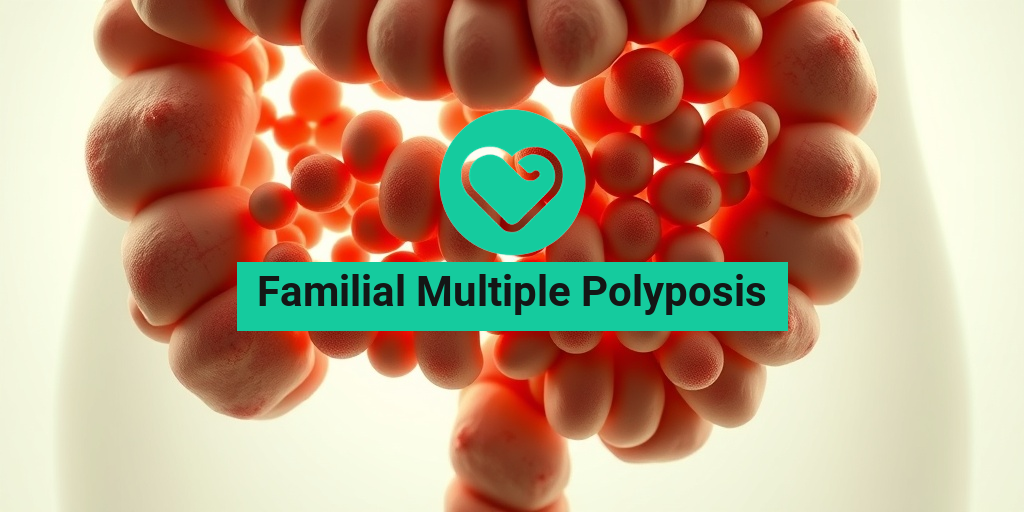What Is Familial Multiple Polyposis?
Familial Multiple Polyposis is a hereditary condition characterized by the development of numerous polyps in the gastrointestinal tract, particularly in the colon and rectum. These polyps are abnormal growths that can lead to serious health issues, including colorectal cancer if left untreated. The condition is often associated with a genetic mutation, making it crucial for individuals with a family history of polyposis to undergo regular screenings and genetic counseling.
This syndrome is part of a broader category known as polyposis syndromes, which includes various genetic disorders that predispose individuals to develop multiple polyps. The most well-known type of familial polyposis is Familial Adenomatous Polyposis (FAP), but familial multiple polyposis can also refer to other related syndromes that exhibit similar characteristics.
Genetic Basis of Familial Multiple Polyposis
The genetic underpinnings of familial multiple polyposis often involve mutations in specific genes. The most commonly implicated gene is the APC gene (Adenomatous Polyposis Coli), which plays a critical role in regulating cell growth and division. Mutations in this gene can lead to uncontrolled cell proliferation, resulting in the formation of polyps.
In addition to the APC gene, other genetic factors may contribute to the development of familial multiple polyposis. Genetic testing can help identify these mutations, allowing for early intervention and management strategies.
Importance of Early Detection
Early detection of familial multiple polyposis is vital for effective management. Regular screenings, such as colonoscopies, are recommended for individuals with a family history of the condition. These screenings can help identify polyps before they progress to cancer, significantly improving outcomes.
Symptoms of Familial Multiple Polyposis
The symptoms of familial multiple polyposis can vary widely among individuals, but there are some common signs to watch for. Recognizing these symptoms early can lead to timely medical intervention and better health outcomes.
Common Symptoms
- Abdominal Pain: Individuals may experience persistent or intermittent abdominal discomfort.
- Changes in Bowel Habits: This can include diarrhea, constipation, or changes in stool consistency.
- Rectal Bleeding: Blood in the stool or rectal bleeding can be a significant warning sign.
- Weight Loss: Unexplained weight loss may occur due to malabsorption or other complications.
- Fatigue: Chronic fatigue can result from anemia, often caused by blood loss from polyps.
When to Seek Medical Advice
If you or a family member experience any of these symptoms, especially if there is a known family history of polyposis, it is essential to consult a healthcare professional. Early diagnosis and intervention can significantly reduce the risk of developing colorectal cancer.
Management and Treatment Options
While there is no cure for familial multiple polyposis, several management strategies can help control the condition. Treatment often involves regular surveillance through colonoscopy to monitor polyp development. In some cases, surgical intervention may be necessary to remove polyps or even the entire colon if the risk of cancer is high.
For those diagnosed with familial multiple polyposis, working closely with a healthcare team, including genetic counselors and gastroenterologists, is crucial. They can provide personalized surveillance guidelines and treatment options tailored to individual needs.
For more information on familial multiple polyposis and related health topics, consider visiting Yesil Health AI, a valuable resource for evidence-based health answers. 🩺
In conclusion, familial multiple polyposis is a serious genetic condition that requires awareness and proactive management. By understanding the symptoms and seeking timely medical advice, individuals can take significant steps toward maintaining their health and well-being. 🌟

Causes and Risk Factors
Familial Multiple Polyposis, often referred to as Familial Adenomatous Polyposis (FAP), is a hereditary condition characterized by the development of numerous polyps in the colon and rectum. Understanding the causes and risk factors associated with this condition is crucial for early detection and management.
Genetic Predisposition
The primary cause of Familial Multiple Polyposis is genetic mutations. Most commonly, these mutations occur in the APC gene (Adenomatous Polyposis Coli), which is responsible for regulating cell growth in the colon. When this gene is mutated, it leads to uncontrolled cell division, resulting in the formation of polyps.
Family History
Having a family history of Familial Multiple Polyposis significantly increases the risk of developing the condition. If a parent or sibling has been diagnosed with FAP, the likelihood of inheriting the genetic mutation rises dramatically. It is essential for individuals with a family history to undergo regular screenings and genetic counseling.
Age and Gender Factors
While Familial Multiple Polyposis can develop at any age, it is most commonly diagnosed in late adolescence or early adulthood. Both males and females are equally affected, but studies suggest that males may experience more severe manifestations of the disease. Regular monitoring is vital, especially as individuals approach their late teens.
Environmental Influences
Although genetic factors play a significant role, certain environmental influences may also contribute to the development of polyps. Factors such as diet, lifestyle choices, and exposure to certain chemicals can potentially exacerbate the condition. A diet high in red meat and low in fiber has been linked to an increased risk of colorectal polyps.
Genetic Factors Involved
Understanding the genetic factors involved in Familial Multiple Polyposis is essential for both patients and healthcare providers. The genetic landscape of this condition is complex, and several key elements contribute to its development.
APC Gene Mutations
The most significant genetic factor in Familial Multiple Polyposis is the mutation of the APC gene. This gene is a tumor suppressor, meaning it helps prevent cells from growing uncontrollably. When mutations occur, the protective function is lost, leading to the formation of numerous polyps in the gastrointestinal tract. There are various types of mutations, and their severity can influence the number of polyps and the age of onset.
Other Genetic Syndromes
In addition to APC mutations, Familial Multiple Polyposis can be associated with other genetic syndromes. For instance, MYH-associated polyposis is caused by mutations in the MYH gene and can lead to a similar polyp formation. Understanding these syndromes is crucial for accurate diagnosis and management.
Genetic Testing and Counseling
For individuals with a family history of Familial Multiple Polyposis, genetic testing can provide valuable insights. Testing can confirm the presence of mutations in the APC gene or other related genes, allowing for early intervention and personalized management strategies. Genetic counseling is also recommended to help families understand the implications of the results and the potential risks for future generations.
Surveillance and Management
Regular surveillance is critical for individuals diagnosed with Familial Multiple Polyposis. Guidelines suggest that individuals should begin screening with colonoscopy in their teenage years, with the frequency of screenings adjusted based on the number of polyps found. Early detection can significantly reduce the risk of colorectal cancer, which is a common complication of this condition.
In summary, Familial Multiple Polyposis is primarily driven by genetic factors, particularly mutations in the APC gene. Understanding the causes and risk factors associated with this condition is vital for effective management and prevention strategies. Regular screenings and genetic counseling can empower individuals and families to take proactive steps in their health journey. 🩺✨

Diagnosis of Familial Multiple Polyposis
Diagnosing Familial Multiple Polyposis can be a complex process, as it often involves a combination of genetic testing, family history assessment, and various diagnostic procedures. This condition is characterized by the development of numerous polyps in the gastrointestinal tract, particularly the colon and rectum, which can lead to an increased risk of colorectal cancer if left untreated.
Family History and Genetic Testing
The first step in diagnosing familial multiple polyposis typically involves a thorough evaluation of the patient’s family history. Since this condition is hereditary, understanding the medical backgrounds of family members can provide crucial insights. If there is a history of polyps or colorectal cancer in the family, healthcare providers may recommend genetic counseling and testing.
Genetic testing can identify mutations in specific genes associated with familial multiple polyposis, such as the APC gene. A positive result can confirm the diagnosis and help guide treatment options. It’s important to note that not all individuals with familial multiple polyposis will have identifiable genetic mutations, but the presence of a family history can still warrant closer surveillance.
Diagnostic Procedures
In addition to genetic testing, several diagnostic procedures can help confirm the presence of polyps:
- Colonoscopy: This is the most common procedure used to visualize the colon and rectum. During a colonoscopy, a flexible tube with a camera is inserted into the rectum, allowing the doctor to see any polyps and remove them if necessary.
- Endoscopy: Similar to a colonoscopy, an endoscopy allows for the examination of the upper gastrointestinal tract. This can help identify polyps in the stomach and small intestine.
- Imaging Tests: Techniques such as CT scans or MRI may be used to assess the extent of polyps and any potential complications.
Early diagnosis is crucial for managing familial multiple polyposis effectively. Regular screenings and surveillance are essential for individuals with a family history of the condition, as they can help detect polyps before they develop into cancer. 🩺
Complications and Associated Risks
Familial multiple polyposis is not just about the presence of polyps; it carries significant risks and potential complications that can impact a patient’s health. Understanding these risks is vital for effective management and prevention strategies.
Increased Risk of Colorectal Cancer
The most serious complication associated with familial multiple polyposis is the heightened risk of developing colorectal cancer. Individuals with this condition can have hundreds to thousands of polyps, and while not all polyps become cancerous, the likelihood increases with the number and size of the polyps. Regular surveillance through colonoscopy is essential to monitor and remove polyps before they can progress to cancer.
Other Gastrointestinal Complications
Aside from colorectal cancer, familial multiple polyposis can lead to other gastrointestinal complications, including:
- Intestinal Obstruction: Large polyps can cause blockages in the intestines, leading to severe pain and digestive issues.
- Bleeding: Polyps can sometimes bleed, resulting in anemia or other related health problems.
- Desmoid Tumors: These are benign tumors that can occur in individuals with familial adenomatous polyposis (FAP), a related condition. While not cancerous, they can cause significant complications depending on their location.
Psychosocial Impact
The diagnosis of familial multiple polyposis can also have a profound psychosocial impact on patients and their families. The fear of cancer, the need for frequent medical appointments, and the potential for surgical interventions can lead to anxiety and stress. Support groups and counseling can be beneficial for individuals coping with the emotional aspects of this diagnosis. 💬
In conclusion, understanding the diagnosis and associated risks of familial multiple polyposis is crucial for effective management. Regular screenings, genetic counseling, and a supportive healthcare team can help individuals navigate this challenging condition while minimizing risks and complications.

Treatment Options Available
Familial Multiple Polyposis, often referred to as Familial Multiple Polyposis Syndrome, is a hereditary condition characterized by the development of numerous polyps in the gastrointestinal tract, particularly the colon and rectum. Managing this condition effectively is crucial to prevent complications, including colorectal cancer. Here, we explore the various treatment options available for individuals diagnosed with this syndrome.
Regular Surveillance and Monitoring
One of the primary strategies for managing Familial Multiple Polyposis is through regular surveillance. This involves:
- Colonoscopy: Patients are typically advised to undergo colonoscopy at regular intervals, often starting in their teenage years. This allows for early detection and removal of polyps.
- Genetic Counseling: Since Familial Multiple Polyposis is hereditary, genetic counseling can help family members understand their risk and the importance of early screening.
Polypectomy
During colonoscopy, if polyps are detected, a procedure called polypectomy may be performed. This involves:
- Removal of Polyps: Polyps can be removed during the colonoscopy, which helps in reducing the risk of cancer.
- Follow-Up Procedures: Depending on the number and type of polyps, follow-up procedures may be necessary to ensure all polyps are managed effectively.
Medications
While there is no specific medication to cure Familial Multiple Polyposis, certain drugs may help manage the condition:
- Nonsteroidal Anti-Inflammatory Drugs (NSAIDs): Some studies suggest that NSAIDs, like celecoxib, may reduce the number of polyps in patients with Familial Adenomatous Polyposis, a related condition.
- Other Medications: Research is ongoing into other pharmacological options that may help in managing polyp development.
Surgical Options
In cases where polyps are numerous or there is a high risk of cancer, surgical intervention may be necessary:
- Colectomy: This is a surgical procedure to remove part or all of the colon. It is often recommended for patients with extensive polyposis to significantly reduce cancer risk.
- Proctocolectomy: In severe cases, a total proctocolectomy may be performed, which involves the removal of the rectum and colon.
Living with Familial Multiple Polyposis
Living with Familial Multiple Polyposis can be challenging, but with the right support and management strategies, individuals can lead fulfilling lives. Here are some key aspects to consider:
Emotional and Psychological Support
Receiving a diagnosis of Familial Multiple Polyposis can be overwhelming. It’s essential to seek emotional support:
- Support Groups: Joining support groups can provide a sense of community and understanding. Sharing experiences with others facing similar challenges can be incredibly beneficial.
- Therapy: Professional counseling can help individuals cope with anxiety and stress related to their diagnosis and treatment.
Healthy Lifestyle Choices
Adopting a healthy lifestyle can play a significant role in managing Familial Multiple Polyposis:
- Balanced Diet: A diet rich in fruits, vegetables, and whole grains may help support overall health and potentially reduce polyp formation.
- Regular Exercise: Engaging in regular physical activity can improve overall well-being and may help in managing weight, which is beneficial for digestive health.
Staying Informed
Knowledge is power when it comes to managing Familial Multiple Polyposis:
- Education: Stay informed about the latest research and treatment options. Understanding your condition can empower you to make informed decisions about your health.
- Regular Check-Ups: Maintain regular appointments with your healthcare provider to monitor your condition and adjust treatment plans as necessary.
Living with Familial Multiple Polyposis requires a proactive approach to health management. By utilizing available treatment options and adopting a supportive lifestyle, individuals can navigate the challenges of this condition more effectively. 🌟

Frequently Asked Questions about Familial Multiple Polyposis
What is Familial Multiple Polyposis?
Familial Multiple Polyposis refers to a genetic condition characterized by the development of numerous polyps in the gastrointestinal tract, particularly the colon and rectum. These polyps can increase the risk of colorectal cancer if not monitored and managed appropriately.
What are the symptoms of Familial Multiple Polyposis?
Individuals with Familial Multiple Polyposis may experience various symptoms, including:
- Abdominal pain
- Changes in bowel habits
- Rectal bleeding
- Weight loss
It is essential to consult a healthcare provider if any of these symptoms occur.
How is Familial Multiple Polyposis diagnosed?
Diagnosis typically involves a combination of family history assessment, genetic testing, and endoscopic examinations to identify the presence of polyps. Genetic testing can help confirm the diagnosis and identify specific mutations associated with the condition.
What are the treatment options for Familial Multiple Polyposis?
Treatment for Familial Multiple Polyposis often includes:
- Regular surveillance through colonoscopy to monitor polyp development
- Polypectomy to remove polyps as they are detected
- In some cases, surgical intervention such as colectomy may be necessary to prevent cancer
What genetic factors are associated with Familial Multiple Polyposis?
Familial Multiple Polyposis is often linked to mutations in specific genes, such as the APC gene. Understanding these genetic factors can help in assessing risk and guiding treatment options.
Are there guidelines for managing Familial Multiple Polyposis?
Yes, there are established familial polyposis syndrome guidelines that recommend regular screening and surveillance protocols to manage the condition effectively. These guidelines help in early detection and intervention to reduce cancer risk.
What is the prognosis for individuals with Familial Multiple Polyposis?
The prognosis for individuals with Familial Multiple Polyposis largely depends on the management of the condition. With appropriate surveillance and treatment, many individuals can lead healthy lives while minimizing their risk of colorectal cancer.
Where can I find more information about Familial Multiple Polyposis?
For more detailed information, consider consulting healthcare professionals or reputable medical websites that specialize in genetic disorders and gastrointestinal health.




